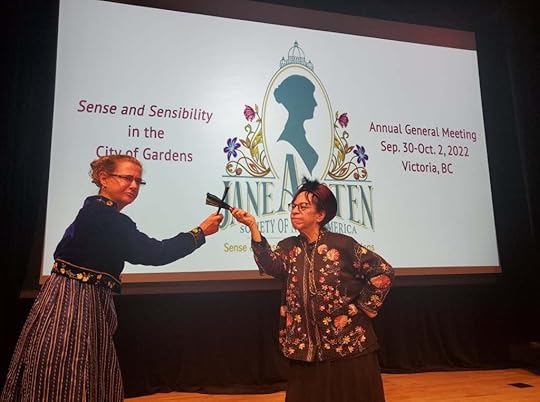What Did Lucy Steele? by Diana Birchall
Who is Lucy Steele, what is she? Does she belong to the cohort of Jane Austen’s villains? Or does she have some excuse for her often distasteful behavior, so brilliantly skewered by Jane Austen? Austen may have meant to slyly suggest evildoing for this character, by her name alone: “Steele” for her steely will, and her grasping, even thieving proclivities; and Lucy for—Lucifer? Yet on close examination she does not quite measure up, or down, to a Jane Austen villain on the grand scale. Major villains, particularly the bully type, such as General Tilney, Lady Catherine, or Mrs. Ferrars, often wield considerable power of a domestic variety, as being at the head of families that have been made dysfunctional largely through their tyranny.

(From Sarah: This is the twenty-fifth guest post in “A Summer Party for Sense and Sensibility,” which began on June 20th and will continue through to the end of the summer. You can find all the contributions to the blog series here . I hope you’ll join the conversations about S&S in the comments here and on social media: #senseandsensibilitysummer. Thanks for celebrating Jane Austen’s first published novel with us!)
Perhaps some villains are born, some achieve villainy, and some have villainy thrust upon them. Lucy Steele, a poor and powerless young woman when we first meet her in Sense and Sensibility, born into poor circumstances, is like others in such circumstances, extremely limited in her choices. Being innately clever, she very early in life comes to the logical conclusion that she must marry for money, and she proceeds to claw her way to success. But all poor young women do not become villains, and the streak of jealous spite and cruelty that Lucy possesses is not entirely explained by her condition.
A heroine like Fanny Price of Mansfield Park, demi-heroine Jane Fairfax of Emma, or Charlotte Lucas of Pride and Prejudice, may be as poor and portionless as Lucy Steele, and still not have bad principles or be breathtakingly self-serving. Jane Fairfax does wrong in consenting to a secret engagement, but Emma reflects, “If a woman can ever be excused for thinking only of herself, it is in a situation like Jane Fairfax’s. Of such, one may almost say, that ‘the world is not their’s, nor the world’s law’” (Volume 3, Chapter 10). Elizabeth, when considering her friend Charlotte’s baldly unromantic marriage, is less forgiving, saying that the woman who marries Mr. Collins can have no real feeling; yet Charlotte has no spite, harms no one else, and is only acting practically, in hope to better her own situation. Ironically, Fanny Price, the poorest of these young women, is the only one who, so far from being determined to marry for money, cannot even be forced into it. Perhaps Lucy’s closest soul sister is Isabella Thorpe of Northanger Abbey, but she is only silly, with none of Lucy’s sharpness.
Among Austen’s penurious young women, Lucy most lacks any kind of fallback protection. The Campbells will never allow Jane Fairfax to starve; Fanny is under the protection of Sir Thomas; Charlotte has a large family, though they would likely use her as a drudge if she doesn’t marry. Lucy is singularly calculating, with her double dealing schemes and complete indifference to the feelings of others. She succeeds in winning her particular pot of gold (if Robert Ferrars with his fancy toothpick cases can be seen as such), though Jane Austen makes it clear that Lucy’s marriage will not achieve the domestic contentment of the others. The selfish behavior Lucy has habitually employed all her life is not improved, but reinforced by the achievement of her object. Nothing is more likely than that someday, Lucy Steele will be the next Mrs. Ferrars, senior, with the de facto headship of a family and its money, and it will then be her turn to wield the malevolent headship of a dysfunctional family with her experienced puppeteer’s hands.
Lucy’s origins, her methods, her ambition, and her success, are all of a piece. Jane Austen sums up her doctrine by saying, “The whole of Lucy’s behaviour in the affair, and the prosperity which crowned it, therefore, may be held forth as a most encouraging instance of what an earnest, an unceasing attention to self-interest . . . will do in securing every advantage of fortune, with no other sacrifice than that of time and conscience” (Volume 3, Chapter 14).
Even as only an embryo villain, Lucy is already one of Austen’s most comically monstrous characters. Lucy is more nuanced than Mrs. Ferrars, the novel’s coldest, one-note monster, though some of her most fawning relations insist that she is the tenderest of mothers. We may detect in Lucy, though never in Mrs. Ferrars, some faint traces of a vestigial and vanishing good nature, perhaps because she has had less time to grow hardened. Her displays of kindness are largely illusory, like her obsequious behavior to her betters (which they never see through—I love Austen’s observation, “Fortunately for those who pay their court through such foibles, a fond mother, though, in pursuit of praise for her children, the most rapacious of human beings, is likewise the most credulous; her demands are exorbitant; but she will swallow anything” [Volume 1, Chapter 21]).
Yet Lucy does have the surprising merit of not being unkind to her inferiors. She tolerates her unbearably silly sister Nancy (though that may only be because she finds her a useful tool). And Mrs. Dashwood’s servant describes her as “a very good natured young lady” (Volume 3, Chapter 11), even using the expressive word “affable.” But Lucy’s affability is part and parcel of her leading skill, her outrageous flattery. Her piled-on solicitousness to the little Middleton children illustrates her in full flight of flattery, unsubtle in her false and saccharine efforts. The reader sees what she is, and so does Elinor, who reflects that her “conduct towards others, made every shew of attention and deference towards herself perfectly valueless” (Volume 1, Chapter 22).
With Robert as her creature, and her steeliness in maintaining an armed stance against imagined threats from Edward and Elinor for the family fortune, by the time Lucy is a senior Ferrars matriarch, any heart she ever had will have hardened completely. Jane Austen shows us characters who do harden (as witness Mr. Elton of Emma, who was not “quite so hardened as his wife, though growing very like her” [Volume 3, Chapter 2]) and knew that a person may grow hardened from bad association, but Lucy is not apparently affected by the influence of anyone else, for good or evil. Elinor shudders to think what Edward’s life would have been, married to Lucy. His morality was such that Lucy would not have corrupted him, in fact he might have made her behavior a shade more respectable. Once married, Lucy might carefully adhere to the rules of conventional middle class moral behavior. But in the end it is Lucy’s own calculating, cold prudence, in changing Edward for Robert, that saves Edward from being her very unhappy husband.
All bona fide Austen heroines have a heart, and desire a marriage of the heart. By that definition alone Lucy is no heroine. Yet rich girls as well as poor in Jane Austen’s England were equally trained to dispense with love in favor of money: in Mansfield Park Lady Bertram’s only advice to Fanny is that it is “every young woman’s duty to accept such a very unexceptionable offer” (Volume 3, Chapter 2). Lucy does not need to be told this piece of wisdom.
If there’s no love in Lucy at all, neither is there much pride, a signal quality of many a villain. Her absence of pride is shown by the fact that there is nothing she will not stoop to, in order to further her ambitions. Where does Lucy’s ambition come from? She herself comes from Exeter, the largest market town in gentle Devonshire. This is a benign location, not a place of unpleasant associations. We know Lucy is “two or three and twenty,” and that she and her nearly thirty-year-old sister divide their time between their father in Exeter, and their uncle Mr. Pratt, who lives near Plymouth. They have no mother, and their father is mentioned only once: Mrs. Jennings speculates on “what little matter Mr. Steele and Mr. Pratt can give” Lucy (Volume 3, Chapter 2). Mrs. Jennings is another connection of Lucy’s, whom she accidentally runs into in Exeter, or possibly pursues there. Through her, Lucy schemes to meet Lady Middleton and the Dashwood sisters, because their connection to Edward’s family might help ingratiate her with Mrs. Ferrars. Lucy is nothing if not far-seeing in her machinations.

Between Plymouth and Exeter Lucy and Nancy seem to have had a lively social life. The two towns are fifty miles apart, so if Lucy spent much time with her uncle the teacher, it must have been worth her while. Perhaps she helped to keep his house, or to care for the young boys who were his pupils; or she might have stayed there in hopes to attract a better class of gentleman husband among her uncle’s pupils than she could find among her old acquaintance at Dawlish and Exeter.
Despite being without fortune, Lucy manages to make a good appearance for herself. When the Miss Dashwoods first meet the Miss Steeles, we are told, “The young ladies arrived, their appearance was by no means ungenteel or unfashionable. Their dress was very smart,” and also, they have “brought the whole coach full of playthings for the [Middleton] children” (Volume 1, Chapter 21). Lucy’s foreplanning is admirable, though how she and Nancy managed to afford all this is a matter of some curiosity, except that we know that one of Lucy’s skills is being able to make a little go a long way. When Elinor pictured Lucy’s marrying Edward, “She saw them in an instant in their parsonage-house; saw in Lucy, the active, contriving manager, uniting at once a desire of smart appearance with the utmost frugality, and ashamed to be suspected of half her economical practices;—pursuing her own interest in every thought, courting the favour of Colonel Brandon, of Mrs. Jennings, and of every wealthy friend” (Volume 3, Chapter 12).
However highly developed the sisters’ talents at wheedling material goods from benefactors, despite all their striving, one thing they never attain is an education. It is a fascinating and hilarious study to examine Nancy’s ungrammatical speech and Lucy’s letters, of which Edward says, “In a sister it is bad enough, but in a wife! How I have blushed over the pages of her writing!” (Volume 3, Chapter 13). Jane Austen illustrates the sisters’ written and spoken style with brilliant observation and wit. Their use “was” for “were” (“I felt almost as if you was an old acquaintance”) and their ungrammatical mistakes like “the person it was drew for,” “Edward have got some business,” and vulgar expressions such as “dreadful low spirited” and “monstrous glad” are priceless.
We may ask how a girl from a family with at least some connections, and contact with educated people (her uncle was considered a suitable enough scholar to teach an upper-class young gentleman like Edward Ferrars) grew up to be “ignorant and illiterate” (Volume 1, Chapter 22), in Elinor’s words, yet spectacularly cunning in achieving her rise. Mr. Pratt may have influenced Edward in his choice of a vocation, but we do not know if Mr. Pratt was a clergyman himself, if he followed the model of Austen’s own father, Mr. Austen, a clergyman who kept scholars. As poor girls, Nancy and Lucy were not given much education (and that Lucy’s is markedly better than Nancy’s may be because she is much cleverer at picking things up, or Mr. Pratt’s circumstances and pupils may have improved from the time when Nancy, now nearly thirty, began to be a young lady). But clearly Mr. Pratt did not stand in the way of his niece’s schemes for attracting Edward. The romance was right under his nose and he may even have promoted it. However, there’s no evidence of his attempting to give his niece any moral sense, nor did her four years’ engagement to Edward improve her.
Lucy knew she had to compete to succeed, and the deviously competitive can scarcely ever have found a more striking embodiment. The subjects of wealth and competence, and self-aggrandizement, are everywhere in this novel, expressed by a girl who said that “how little soever [Edward Ferrars] had, she should be very glad to have it all” (Volume 3, Chapter 2). Yet even though Lucy ultimately becomes the financial victor of Sense and Sensibility, her happiness is not likely, as Austen indicates in this marvelously ironic and witty description: “setting aside the jealousies and ill-will continually subsisting between Fanny and Lucy, in which their husbands of course took a part, as well as the frequent domestic disagreements between Robert and Lucy themselves, nothing could exceed the harmony in which they all lived together” (Volume 3, Chapter 14).
Lucy’s innate spitefulness is an extra fillip on top of her necessitous scheming. Jane Austen tells us how after her marriage, “They passed some months in great happiness at Dawlish; for she had many relations and old acquaintance to cut,” a clear depiction of gratuitous behavior. Spite she has, in plenty: her “flourish of malice” in letting the Dashwoods believe she had married Edward, by her elaborate charade of showing herself and her new husband to their servant, proves this, and Edward himself ended with believing her “capable of the utmost meanness of wanton ill-nature” (Volume 3, Chapter 13).
We cannot know what gave Lucy her spice of spite. Few characters are as purely spiteful as she; a quality that in others generally originates in jealousy, as exampled by Caroline Bingley in Pride and Prejudice (“She a beauty! I should have as soon called her mother a wit”). Yet, Caroline mends her manners after Darcy marries Elizabeth, while Lucy’s spite toward Elinor, even after she has achieved her own goal, is solely and maliciously intended to cause pain.
And here our guessing about Lucy must end, for we know little about her earliest influences. Her uncle may have had a benign influence on Edward, but did he teach his niece spite, or act as advisor—was he her evil genius? There is no such indication. At this point we may observe the deliberate limiting of Austen’s artistic canvas. About her major characters we usually know a good deal—for she has conceived her fictional world in such perfection, so rich in details—but like an artist who does not paint all the details to the borders of his paintings, she leaves minor edges fading into obscurity. She could no doubt tell us every detail of Lucy’s background and upbringing, had she been so minded, and she does give a few hints that readers of her own era might have read more easily than we. But she chooses not to tell more.
It is Lucy’s selfishness that Austen most amply delineates, with comical, human relish. The manipulations with which Lucy minutely carries out her ends are depicted with penetrating, devastating wit. We see precisely what Lucy is up to; it is through her actions that we know her. We also know what it was that Lucy stole: A family fortune and any chance of wider family harmony.

Quotations are from the Oxford University Press editions of The Novels of Jane Austen, edited by R. W. Chapman.
A note from Diana: This essay was first written as notes for the play of the same title that I wrote with Syrie James which we performed at the JASNA AGM in 2022 in Victoria, BC. In this photo we’re performing the hilarious fan fight scene in the Victoria AGM performance of “What Did Lucy Steele?” She is Lucy and I’m Mrs. Ferrars.

Diana Birchall worked for many years as a story analyst for Warner Bros Studios, reading novels to see if they would make movies. Reading popular fiction went side by side with a lifetime of Jane Austen scholarship and writing Austenesque fiction both as homage and as close study of Jane Austen’s style. She is the author of Mrs. Darcy’s Dilemma, The Bride of Northanger, In Defense of Mrs. Elton and Mrs. Elton in America, as well as hundreds of short stories. Her Austenesque comedy plays have been performed in many cities, with “You Are Passionate, Jane,” a dialogue between Jane Austen and Charlotte Bronte in Heaven, being presented at Chawton House Library in England. It was also filmed and presented with discussion by the Jane Austen Summer Program, and is now available to watch on YouTube.

Diana has also written a scholarly biography of her grandmother, the first Asian American novelist, Onoto Watanna, and has lectured widely about her books at universities including Yale, Columbia, and NYU. She grew up in New York City, and now lives in Santa Monica, California. Her husband Peter was a poet, and her son Paul is the librarian on Catalina Island. The first flower photo (lupines and leopard lilies) was taken in the Sierras. Diana and Peter did most of their hiking near Mammoth and in Sequoia National Park. The other flower photos are wild nasturtium and iceplant, Southern California wildflowers that grow near Diana’s home.

A chapter from Diana’s story of The Darcys in Venice was published at Austen Variations recently and I enjoyed it so much that I want to share the link. Here’s Mr. Collins, addressing Lord Byron:
“Do you know, this garden almost reminds me of Rosings, though of course Rosings does not have a canal, and is all the better for that. Nothing, after all, can equal Rosings. The water here does not look quite clean. It is indeed an image that speaks eloquently of the moral failings of this city and its people. A very sluggish stream, indeed.”
If you enjoyed this post, I hope you’ll consider recommending it to a friend. If you aren’t yet a subscriber, please sign up to receive future guest posts in “A Summer Party for Sense and Sensibility.” The next post is by L. Bao Bui, who explores the struggle to perceive character and intentions accurately in S&S.
Here are the links to the last two posts, in case you missed them:
A book signing and other celebrations (written by me)
The Real Romantic? Marianne Dashwood and Fanny Price, by Theresa Kenney

Read more about my books, including Jane Austen’s Philosophy of the Virtues and Jane Austen and the North Atlantic, here.



